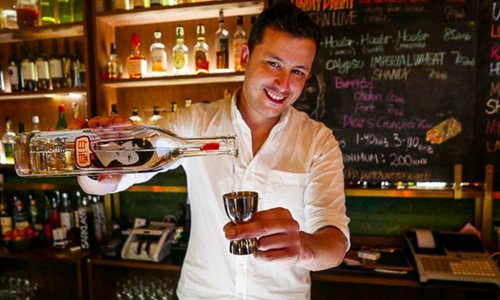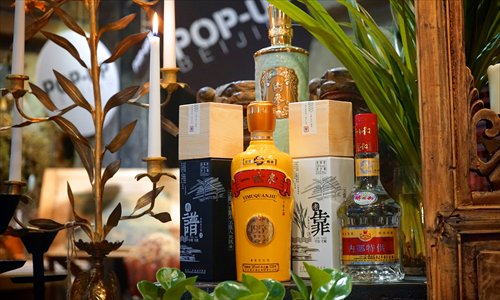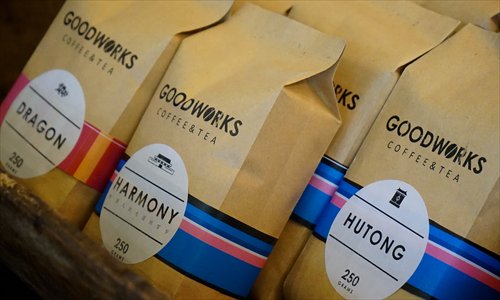Growing appreciation for baijiu spurs exotic cocktails and business opportunities locally and abroad

A bartender in Shanghai uses American baijiu brand, byejoe, to make a fruit cocktail. Photo: Courtesy of Matt Trusch
For most foreigners who live in China, drinking baijiu (Chinese white liquor) and doing ganbei (bottoms up) is unavoidable, especially in the presence of senior colleagues and friends - no Chinese celebration or business deal is complete without a toast with some baijiu.
Nick Van Leeuwen, a 28-year-old Australian, who has been living in China for five years, is no exception. His most memorable ganbei experience was drinking a homemade baijiu in Henan Province.
"The baijiu was very strong. You could feel it going down your throat and into your stomach. I guess its alcohol level was around 70 to 80 percent; you could light a fire with it," said Van Leeuwen. He got drunk after several ganbei toasts.
Baijiu is the most consumed spirit on the planet by sales volume, with 1.14, 1.16 and 1.17 billion 9L cases consumed in 2011, 2012 and 2013 respectively, according to the 2014 International Wine and Spirits Record report.
Many foreigners in China are familiar with the baijiu ganbei culture. Some of them, like Van Leeuwen, think the culture of toasting with white liquor and emptying your glass on each toast is an interesting way of breaking the ice and getting to know people more. Others either don't like the taste or have bad experiences with the drink and keep their distance from it. Meanwhile, many foreigners outside of China have almost never heard of it.
To better promote baijiu around the world, some foreigners in China, fans of Chinese baijiu, have come up with some novel ideas to increase local and international knowledge about the liquor.
World Baijiu Day, which falls on August 9 and will be celebrated in 25 places around the world this year, is one of those efforts. A pre-celebration event was held on Saturday at POP-UP BEIJING. Having enjoyed the inaugural staging last year, Van Leeuwen also attended Saturday's event.
"I am looking forward to trying baijiu tea and baijiu coffee," he said. "[Last year,] I tried Chinese baijiu with a cocktail and baijiu with pizza. To my surprise, they taste good when they are combined," he said.
A small group of foreign baijiu lovers, owners of local bars and foreign white liquor companies in other countries, is trying to find new ways to increase baijiu culture around the world by lowering its alcohol level, adding new ingredients, tweaking its brewing method and re-conceptualizing its packaging.

Baijiu enthusiasts and flavor developers are finding another side of baijiu with baijiu infused cocktails, teas and coffees. Photo: Courtesy of POP-UP BEIJING

An American tries byejoe at a bar in Miami in the US. Photo: Courtesy of Matt Trusch
World Baijiu Day
"Smell first then sip it," said Jim Boyce, the World Baijiu Day organizer, as he explained the contents of each tass of baijiu to dozens of spirit lovers at the pre-celebration event.
A Canadian wine expert and wine blogger based in Beijing, Boyce has two main goals for the event this year. First, he wants to give more people a chance to try baijiu, and second, he wants to go "beyond ganbei" to show the potential for baijiu pairing with cocktails, foods, coffee, chocolate, liqueurs and more. Both Chinese and foreigners alike can enjoy baijiu infusions such as baijiu tea, baijiu coffee and taste white liquor from other countries, he said.
A total of 25 cities, including Beijing, New York, London and Sydney, will participate in this year's event, an increase over 2015.
"The event last year was successful, and many bars and restaurants wanted to do the event again," Boyce said.
Compared with last year, the trend of adding new elements to the Chinese baijiu culture is increasing. Attendees have a wealth of baijiu to choose from: Chinese traditional baijiu, American baijiu, New Zealand baijiu and many mixtures and pairings to sample.
For example, more beer mixtures have been added this year. "When people make baijiu, they use qu (a distiller's yeast used in the production of most Chinese alcoholic beverages) to make sugar become alcohol. This year, some beer makers are using baijiu's qu to make beer as a new product," said Boyce.
Coffee lovers can also sample coffee and baijiu, he said. After the coffee is added, the color stays brown, but the baijiu mixes with the coffee to create a new fusion flavor that is not too overpowering.
"Whether it's going to be popular, I don't know. But if people say they really enjoy this new product, then that's the power of the project," said Boyce. "[It's] fine if they don't like it. My goal is to let people know what baijiu is and try it. It has the number one sales volume in the world, rather than whiskey, gin, and other liquor."
He said most foreigners outside of China don't know what baijiu is, which makes promoting baijiu challenging.
"It's going to take 10 or 20 years and hundreds of people joining in to promote baijiu to the world," he said.

One of the coffee brands that were used to create baijiu coffee mixtures at POP-UP BEIJING's pre-World Baijiu Day celebration on Saturday. Photo: Courtesy of POP-UP BEIJING
Going beyond ganbei
The more baijiu Van Leeuwen drinks, the more Chinese baijiu culture he gets to know. For him, there are plenty of occasions that call for ganbei.
"For example, when I drink baijiu during a casual occasion, I just do ganbei and drink. However, if the occasion is a business dinner, I usually go around the table to toast with every seated person. I also need to say something before doing ganbei, such as giving a self-introduction," he said.
In his mind, ganbei culture is interesting and useful for conducting business in China. But, some foreign consumers are not buying the ganbei culture.
Glenn Schuitman shares the same outlook. Schuitman, 45, is the co-founder of POP-UP BEIJING. He came to Beijing from New Zealand a decade ago, and is one of the bar members participating in World Baijiu Day.
Schuitman said the only disadvantage of baijiu is its high alcohol content. "Ganbei culture is fun, particularly with friends. But it doesn't often have a happy ending," he said. "It is difficult to appreciate when you drink it so quickly."
Schuitman uses the Western way of drinking wine to promote baijiu to his customers. "At POP-UP BEIJING, we actually have a 'no ganbei' policy, because we believe baijiu, which is just like wine and spirits, can be enjoyed much more when being sipped and savored."
Besides sipping straight baijiu, Boyce thought up many other ways to promote baijiu to potential consumers. "Some people drink whiskey straight, 100 percent. Some drink it with two drops of water, and some drink it with coke. Considering that, we want to increase baijiu choices, such as drink it with cocktail, tea or coffee."
Working in Chinese wine industry, one of Boyce's jobs is to promote Chinese wine. When Boyce promoted Chinese wine 10 years ago, people said they would never drink Chinese wine. But things have changed. People contact Boyce every day to ask him about Chinese wine.
"Why did they change? Because we introduced it to many foreigners, their thinking started to change over time," he said. Boyce has taken a similar approach to the way he promotes Chinese baijiu.
One way that has met with some success so far is what he calls "flight baijiu": three small serving of baijiu.
"'Flight baijiu' works very well for new baijiu consumers to try baijiu. I found a lot of people like to drink flight baijiu, which is three small glasses with three different baijiu, such as Moutai, Wuliangye (a famous Chinese liquor from Sichuan Province), and Yimuquan (baijiu from Hebei Province)," he said. "When they try baijiu in this way, they can taste the differences of baijiu. It works very well for consumers."
East meets West
If Matt Trusch didn't go to the Harbin Institute of Technology in Heilongjiang Province as an exchange student 24 years ago, he might not have discovered his love for baijiu.
Trusch, 44, a Jewish American who has been living in China for around 15 years, is the founder and creator of byejoe, a company that produces baijiu with infused flavors including dragon fruit, lychee, hot chilies, passion fruit, peach, and pomegranate.
"The first time I drank baijiu was in the winter of 1992. I drank it to stay warm," he said. What started out of necessity grew into a passion. In 2011, he decided to bring Chinese baijiu to America and founded his own baijiu brand.
He imported 100 percent proof baijiu from China and used an American filtration system to improve the spirit. He lowered its alcohol level to 35 to 40 percent, infused fruit flavors and modernized its packaging.
The modified baijiu has gained some traction in the US. Compared with traditional baijiu, byejoe's lowered alcohol level and lower calories make it easier for Americans, especially the younger generation, to accept, Trusch said.
"Around 70 percent of my consumers are young people in America," he said.
The novel ways of drinking baijiu with other ingredients is another way to promote baijiu around the world. Van Leeuwen said that some people may not be able to get used to modified baijiu. "The older generation may not want to try foreign products or creative baijiu which doesn't taste like traditional Chinese baijiu," he said. "However, the younger generation or people who never tried baijiu before are probably more open to trying baijiu in a cocktail, tea and coffee."
Boyce agreed, saying baijiu cocktails got positive feedback last year.
"It's possible that for some baijiu and cocktail lovers, after two to three years, they may say they want to try baijiu without a cocktail," he said, which is a good start.
Newspaper headline: That’s the spirit